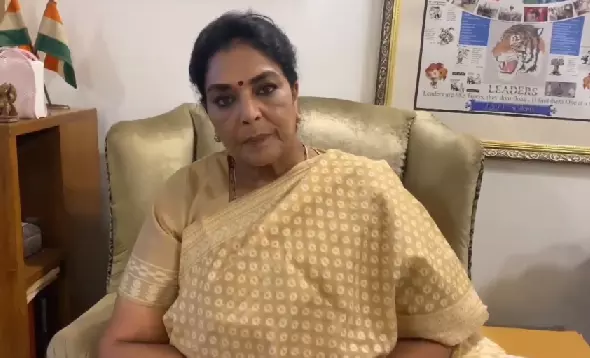
‘Jobless men can’t marry, reproduce’: Congress MP slams Bhagwat’s ‘3 kids’ advice
Congress MP Renuka Chowdhury says RSS chief must speak only from experience

Congress MP Renuka Chowdhury on Monday (December 2) tore into RSS chief Mohan Bhagwat for his advice to Indian couples to have three children to maintain the country’s population growth, wondering how he can ask men to marry and reproduce when there are no jobs.
Pointing to the job crisis in the country, Chowdhury said the situation is so dire that old parents have to toil to fend for their children and at this juncture asking youth to marry and produce children is not a sensible statement.
‘No one will give daughter to jobless man’
“The unemployed men in the country cannot get married because no one is willing to fix their daughters’ wedding with a jobless man. They don’t have jobs. How will they take care (of their spouses)? There is no money. Elderly parents are working and looking after their children. And he is saying produce more children. Are we rabbits that we will keep reproducing?” NDTV quoted her as saying outside Parliament.
Taking a dig at Bhagwat and the RSS, which advocates celibacy, Chowdhury said he must say things only if he has experience in them.
Also read: ‘National interest’ vs lack of resources: Bhagwat’s population remark sparks debate
Dig at RSS
“Those who are talking, how many children can they bring up? What is their experience? We know,” she said.
Talking about the needs of a family, Chowdhury said it is a time when food is adulterated and the prices of essential items and travel are shooting through the roof.
“If anyone gets sick and is hospitalised, the treatment costs are huge,” she said.
What Bhagwat said
Bhagwat in an event on Sunday (December 1) had expressed concern over India’s declining population growth and said that its Total Fertility Rate (TFR) – the average number of children a woman gives birth to in her lifetime – should be at least 3, well above the present one of 2.1.
Highlighting the vital role of families in society, he had also warned that, according to population science, if a society's total fertility rate dips below 2.1, it could face extinction.
Also read: Why South Indian CMs should stop viewing uteruses as voting machines
“Many languages and cultures have already disappeared due to this issue. Thus, it is essential to maintain a fertility rate above 2.1," Bhagwat said, and emphasized that "kutumb" (family) is an integral part of society and every family serves as a vital building bloc.
Declining TFR
“Our country’s population policy, formulated either in 1998 or 2002, clearly says that the total fertility rate should not be below 2.1. Now when we say 2.1, it is not feasible to have children in fraction. So when we say 2.1, this means it should be more, at least three. The (population) science says so,” Bhagwat said.
India’s TFR has declined from 2.2 to 2 while the Contraceptive Prevalence Rate has increased from 54 per cent to 67 per cent, according to the National Family Health Survey data released in 2021.
Also read: Sinister conspiracies are testing India's resolve, says RSS chief in Dussehra speech
A total fertility rate of 2.1 is considered as the replacement rate, which is a crucial factor in population growth. It ensures the replacement of a woman and her partner upon death with no overall increase or decrease in numbers.
Owaisi’s jibe at Bhagwat
AIMIM chief and Hyderabad MP Asaduddin Owaisi had criticised Bhagwat for his comment, stating that if the RSS chief wants people to produce more children, those in the organisation must first walk the talk.

